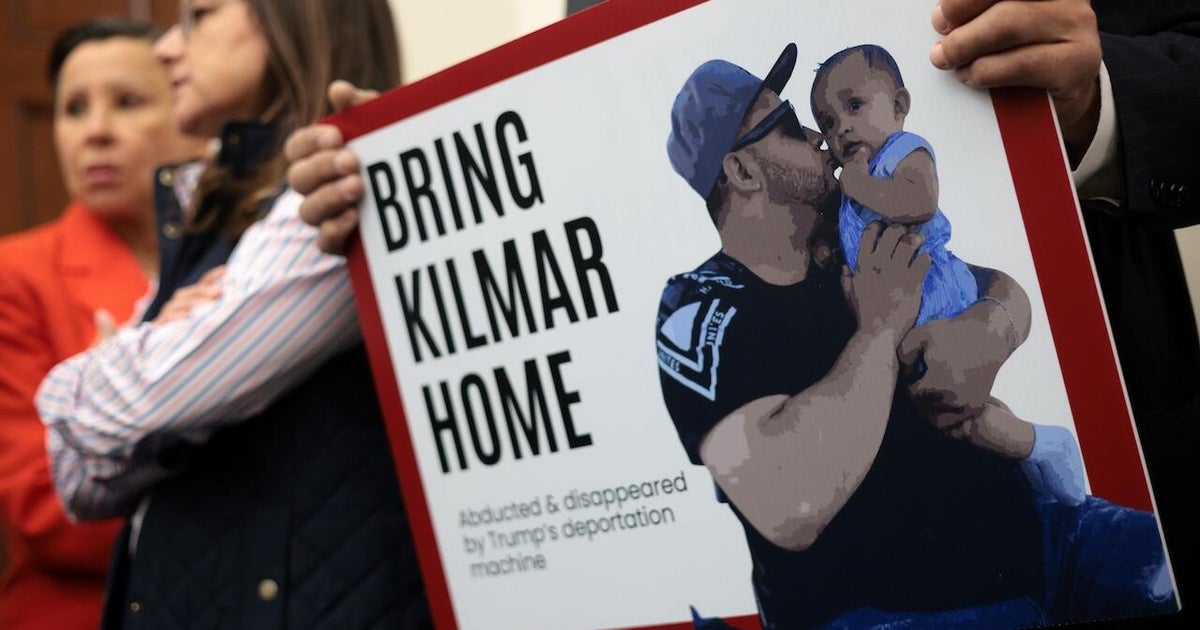
Washington — A federal appeals court said Thursday that the Trump administration’s assertions in the case of a Maryland man who it admitted was mistakenly deported to El Salvador should be “shocking” to all Americans and made an appeal to the executive branch to vindicate the importance of the rule of law.
The brief unanimous opinion authored by Judge Harvie Wilkinson of the U.S. Court of Appeals for the 4th Circuit rejected a request from the Trump administration to pause a district judge’s order that required it to facilitate the release of Kilmar Abrego Garcia, a 29-year-old who lives in Maryland, from Salvadoran custody, and explain the steps it has taken to return him to the U.S.
“The government is asserting a right to stash away residents of this country in foreign prisons without the semblance of due process that is the foundation of our constitutional order,” Wilkinson, who was appointed by President Ronald Reagan, wrote. “Further, it claims in essence that because it has rid itself of custody that there is nothing that can be done. This should be shocking not only to judges, but to the intuitive sense of liberty that Americans far removed from courthouses still hold dear.”
Wilkinson was joined in his opinion by Judges Robert King, nominated by President Bill Clinton, and Stephanie Thacker, appointed by President Barack Obama.
The judge acknowledged that the executive branch has “enormous” powers to prosecute and deport noncitizens, but warned that the administration’s actions so far could put U.S. citizens at risk.
“If today the Executive claims the right to deport without due process and in disregard of court orders, what assurance will there be tomorrow that it will not deport American citizens and then disclaim responsibility to bring them home?” Wilkinson wrote. “And what assurance shall there be that the executive will not train its broad discretionary powers upon its political enemies?”
In his opinion, Wilkinson wrote of the tensions that can exist between the executive and judicial branches, but said that these differences require an effort at “mutual respect.” He lamented that “too often today” the executive branch has not afforded the courts that respect, and cited calls for judges to be impeached for decisions the government disagrees with, as well as pressure to disregard judicial orders.
“It is, as we have noted, all too possible to see in this case an incipient crisis, but it may present an opportunity as well,” he wrote. “We yet cling to the hope that it is not naïve to believe our good brethren in the Executive Branch perceive the rule of law as vital to the American ethos. This case presents their unique chance to vindicate that value and to summon the best that is within us while there is still time.”
Abrego Garcia’s case has exploded simmering tensions between the federal judiciary and the Trump administration, which has been undertaking a sweeping crackdown on illegal immigration.
The Salvadoran national came to the U.S. unlawfully in 2011 and was arrested in 2019. Administration officials claim that Abrego Garcia is a member of the gang MS-13, citing allegations from a confidential informant and his attire — a Chicago Bulls hat and a hoodie — at the time of his arrest. Abrego Garcia’s lawyers have said he is not a gang member and has never been charged with or convicted of any crime in the U.S. or El Salvador.
Abrego Garcia was released from immigration custody in October 2019 and granted withholding of removal by an immigration judge, which is a legal status that forbids the government from deporting him back to his home country of El Salvador.
He was living with his wife, a U.S. citizen, and their children in Maryland until he was arrested by immigration authorities in March and sent to El Salvador, where he and more than 200 others have been confined at the Terrorism Confinement Center, a notorious prison known as CECOT.
Immigration officials in the Trump administration have acknowledged that Abrego Garcia’s removal to El Salvador last month was an “administrative error” because of the withholding of removal, but efforts to have him brought back to the U.S. have sparked a fierce legal battle.
U.S. District Judge Paula Xinis ordered the Trump administration earlier this month to “facilitate and effectuate” Abrego Garcia’s return from El Salvador, and the case landed before the Supreme Court. The high court then ruled last week that Xinis properly required the government to “facilitate” his release from custody in El Salvador, but said she should clarify the scope of her decision as to effectuating Abrego Garcia’s return.
The district judge issued an amended decision that ordered the administration to facilitate Abrego Garcia’s release from custody as soon as possible. She also required the government to give her information about his whereabouts, as well as what steps it was taking to bring him back to the U.S.
The Trump administration has so far rebuffed her requests for that information, but has acknowledged that Abrego Garcia is alive and detained at CECOT. Justice Department lawyers have said they will remove “any domestic barriers” to his return, but they have argued the U.S. does not have the power to force the Salvadoran government to release him.
In his decision, Wilkinson said the court will not “micromanage” Xinis’ attempt to implement the Supreme Court’s decision, which he acknowledged requires lower courts to give consideration to the deference owed to the executive branch when conducting foreign affairs.
“The Supreme Court’s decision does not, however, allow the government to do essentially nothing,” he wrote.
In addition to ordering the Trump administration to facilitate Abrego Garcia’s return, Xinis earlier this week said that she will allow expedited discovery to determine what the Trump administration has done to return him to the U.S.
